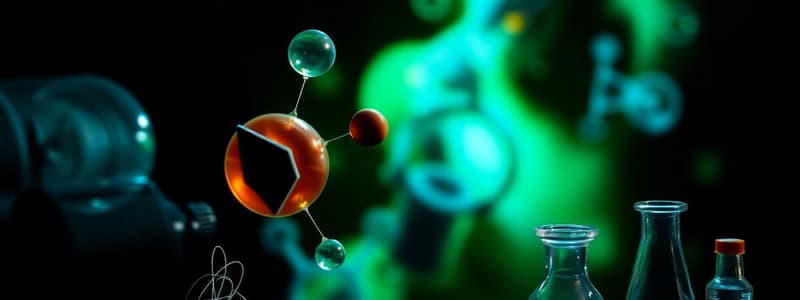Podcast
Questions and Answers
Which of the following best defines the scientific method?
Which of the following best defines the scientific method?
- A series of steps to solve mathematical problems.
- An approach focusing exclusively on theoretical concepts.
- A process that involves observation, hypothesis, and experiment. (correct)
- A method used solely in the social sciences.
What is the primary focus of the field of physics?
What is the primary focus of the field of physics?
- Study of natural phenomena. (correct)
- Study of living organisms.
- Study of human behavior.
- Study of numbers and quantities.
What role does peer review serve in scientific research?
What role does peer review serve in scientific research?
- It ensures that scientific work is based on mathematical models.
- It verifies the statistical significance of experiments.
- It evaluates scientific work by experts to ensure quality and credibility. (correct)
- It promotes collaboration among researchers.
Which branch of science is primarily concerned with human behavior and societies?
Which branch of science is primarily concerned with human behavior and societies?
What component of the scientific method involves interpreting the data gathered from experiments?
What component of the scientific method involves interpreting the data gathered from experiments?
Which of the following best describes a scientific theory?
Which of the following best describes a scientific theory?
What ethical issue is crucial in scientific research to ensure integrity?
What ethical issue is crucial in scientific research to ensure integrity?
What is the purpose of conducting replication in scientific experiments?
What is the purpose of conducting replication in scientific experiments?
Flashcards are hidden until you start studying
Study Notes
Definition of Science
- Systematic study of the structure and behavior of the physical and natural world.
- Follows methodologies that include observation, experimentation, and analysis.
Branches of Science
-
Natural Sciences
- Study of natural phenomena.
- Subfields:
- Physics: Study of matter, energy, and their interactions.
- Chemistry: Study of substances, their properties, and reactions.
- Biology: Study of living organisms and their interactions.
-
Formal Sciences
- Study of abstract concepts and systems.
- Subfields:
- Mathematics: Study of numbers, quantities, and shapes.
- Logic: Study of reasoning and arguments.
-
Social Sciences
- Study of human behavior and societies.
- Subfields:
- Psychology: Study of the mind and behavior.
- Sociology: Study of social behavior and institutions.
- Economics: Study of production, distribution, and consumption of goods.
Scientific Method
- A systematic approach to inquiry.
- Observation: Identifying a phenomenon or a question.
- Hypothesis: Formulating a testable explanation.
- Experimentation: Conducting tests to gather data.
- Analysis: Interpreting data to support or refute the hypothesis.
- Conclusion: Drawing inferences based on analysis.
- Replication: Repeating the experiment to verify results.
Importance of Science
- Advances knowledge and understanding of the universe.
- Drives technological advancements and innovation.
- Addresses global challenges through research (e.g., climate change, health).
- Contributes to informed decision-making and policy.
Key Concepts
- Theory: A well-substantiated explanation of an aspect of the natural world.
- Law: A statement based on repeated experimental observations that describes an aspect of the universe.
- Peer Review: Process of evaluating scientific work by experts in the field to ensure quality and credibility.
Ethical Considerations
- Importance of ethics in scientific research.
- Issues such as plagiarism, data fabrication, and consent.
- Ensuring integrity and accountability in scientific studies.
Science: A Definition and its Branches
- Science is the systematic study of the structure and behavior of the physical and natural world through observation, experimentation, and analysis.
- Natural sciences explore natural phenomena, encompassing physics (matter, energy, and their interactions), chemistry (substances, properties, and reactions), and biology (living organisms and their interactions).
- Formal sciences deal with abstract concepts and systems, including mathematics (numbers, quantities, and shapes) and logic (reasoning and arguments).
- Social sciences focus on human behavior and societies, covering psychology (mind and behavior), sociology (social behavior and institutions), and economics (production, distribution, and consumption).
The Scientific Method: A Systematic Approach
- The scientific method involves observation of a phenomenon, formulation of a testable hypothesis, experimentation to gather data, analysis of this data to support or refute the hypothesis, drawing conclusions, and replication of the experiment for verification.
The Importance and Impact of Science
- Science expands our knowledge and understanding of the universe.
- It fuels technological advancements and innovation.
- It plays a crucial role in addressing global challenges like climate change and health issues.
- Science informs decision-making and policy development.
Core Scientific Concepts
- A scientific theory is a well-substantiated explanation of some aspect of the natural world.
- A scientific law is a statement based on repeated observations that describes a facet of the universe.
- Peer review is a vital process for evaluating scientific work, ensuring quality and credibility.
Ethical Considerations in Science
- Ethical considerations are paramount in scientific research.
- This includes addressing issues like plagiarism, data fabrication, and obtaining informed consent.
- Maintaining integrity and accountability is crucial in scientific studies.
Studying That Suits You
Use AI to generate personalized quizzes and flashcards to suit your learning preferences.




